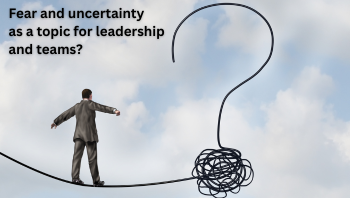Teams and leadership: stay healthy in crises
Crises and stress change companies. Find out why long-term stress influences personality, what biological consequences occur and how companies can take countermeasures.
Psychological safety – Why should this be an issue for companies right now?
If we look at the existing multiple crises through the lens of personality models, it is not unlikely that people will experience these crises very personally. And it is extremely important not to label this “personal crisis experience” as a “personal problem”.
Geopolitical and economic perspectives
From a geopolitical perspective, the withdrawal of the USA from Western institutions, as the protective power of the Western way of life, and from its support of Ukraine, has opened up the most serious crisis since the Second World War. The climate crisis has slipped out of focus, but is of course still acute.
Companies are facing massive shifts in supply chains, an uncertain global economic outlook and an intensifying trade war. These factors make reliable strategic planning considerably more difficult. As a result, extensive job cuts are planned over the next two years, including at Airbus (approx. 2,000), Schaeffler (approx. 4,700), Ford (approx. 4,000), DHL (approx. 8,000), ThyssenKrupp (approx. 3,000), Continental (approx. 3,000) and Volkswagen (at least 10,000) (Business Insider, Feb. 2025).
Municipalities are thus facing falling tax revenues and rising expenses – in an already strained budgetary situation.
Impact on employees and companies
Employees are feeling enormous pressure to change: The demands on their professional role are changing rapidly. Corporate structures are being rebuilt, artificial intelligence is changing processes, routines are disappearing or being replaced. Many are asking themselves: How can I remain attractive for my company or agency? Is there still a secure job for me?
The sense of personal unrest, the feeling of loss of control and insecurity thus has very real causes.
Effects of prolonged stress on personality
We know that long-term stress (over years to decades) can cause stable personality changes in the Big Five dimensions:
1. Increased anxiety & irritability (neuroticism): emotional instability increases.
2. Social withdrawal: the desire for interaction and social support decreases.
3. Less openness: cognitive flexibility and adaptability decrease.
4. Decreasing tolerance: irritability and loss of empathy occur.
5. Decreasing conscientiousness: Self-organization and error control deteriorate.
Biological stress markers and their consequences
Chronic stress can cause demonstrable biological changes:
- Cortisol dysregulation: Permanently high or depleted cortisol levels lead to emotional exhaustion or increased irritability. Employees may feel permanently tired or react in an uncontrolled manner.
- Neural changes:
- Reduced hippocampus size: memory and concentration problems, which are particularly hindering in complex decision-making processes.
- Increased amygdala activity: increased anxiety reactions that inhibit innovation and risk-taking.
- Weakened impulse control: Emotional imbalances can lead to increased team conflicts and rash decisions.
- Epigenetic adjustments: Chronic stress can permanently alter genes that control emotional regulation.
Example: A person who is under constant stress could develop an increased susceptibility to anxiety disorders or depression in the long term. Example B: Increased risk of disease: dysregulated genes increase the risk of cardiovascular disease, diabetes or neurodegenerative diseases.
Impact on performance in companies
These effects can be seen directly in everyday work:
- Less flexibility & creativity: employees find it more difficult to deal with new challenges.
- Limited social interaction: teamwork suffers, conflicts increase.
- More mistakes and wrong decisions: Declining self-organization leads to a drop in performance.
Crisis management as a corporate task
In difficult management situations, companies often resort to a knee-jerk reaction: they “privatize” their employees' personal problems, leaving them to their own means of coping. But this strategy is insufficient in the current situation. Instead, this creates an important systemic field of action for companies, teams and, in particular, HR departments.
If the phrase “Our employees are our priority” ever applied, it does now.
Recommendations for companies
To minimize long-term stress and its effects, companies should actively counteract it: ✔ Promote psychological safety: Employees must be able to talk openly about their challenges. Establish resilience programs: Measures such as coaching, stress management training or flexible working models help in the long term. Sensitize managers: Training for managers helps them recognize early warning signs and provide targeted support. Comprehend change as a system task: Do not leave employees alone, but take responsibility as an organization.
Our main topic next month
How can companies and teams actively contribute to us staying mentally healthy and productive in this seemingly “crazy situation”? What specific measures are necessary? What new approaches are there for HR and managers?
We will be taking a close look at these questions in the coming month. Join the discussion! What experiences have you already had?


About me

All Rights Reserved
Get in touch
-
+49-(0)941 600 93 003
-
This email address is being protected from spambots. You need JavaScript enabled to view it. -
Thomas_Huber
ToChange Gmbh
-
Thomas Huber
-
Traubengasse 6
-
D-93059 Regensburg

